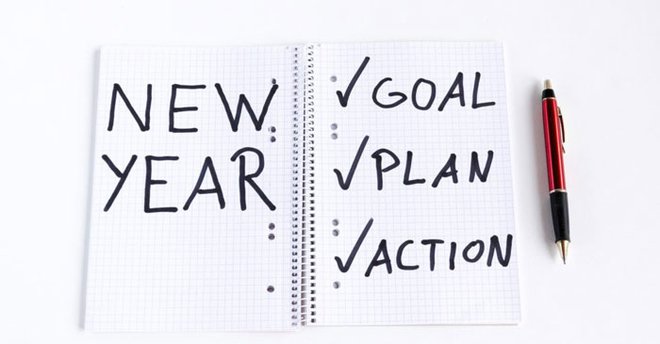Are you ringing in the new decade with some snazzy goals for yourself? Are you aiming to drop some pesky bad habits in the new year? If you’re not good with sticking to New Year’s Resolutions, listen up! This simple plan can help you wave weak willpower goodbye. Think you won’t last through February? The trick is to not give up too soon. And remember, it’s never too late to hit the “reset” button when it comes to making YOU a priority, no matter what month it is!
 Think you can't stick with your resolutions? Think again!
Think you can't stick with your resolutions? Think again!
Make an Action Plan
What changes do you really want to make in your life? 2020 can be the year it happens. Whether it’s stressing out less, getting better grades or just making more time for your hobbies, the “action plan” helps to break it all down to the details. These daily tweaks quickly add up to success. Clear goals along with an action plan will help you figure out the “why” and “how” of what you hope to do.
 If your goals are clear and your plan is solid, you’re well on your way to crushing it in anything you try to do!
If your goals are clear and your plan is solid, you’re well on your way to crushing it in anything you try to do!
Say you want to add exercise to your life in order to have more energy and feel more comfortable in your clothes. Exactly when and where will you do it? If your schedule gets crazy busy, how will you deal? An action plan helps you iron out these darned details and get right back on track should you fall off the wagon.
Get specific with your goals
Get started by choosing a long-term goal. Really think about this.
Pretend you see yourself six months from now, having achieved this goal. What does this different “you” look like? How does this person feel?
 Why do you want to make these changes? Think about the deep-down reason why.
Why do you want to make these changes? Think about the deep-down reason why.
Now think about why you want to become this person. The real, deep-down why, not the “I want to look better” why. Think about the real ways you think this change will improve your life. Do you want to be more confident? Would you love to feel less tired all the time? Grab a piece of paper and write this down.
Next, with your long-term goal in mind, think of 1-3 shorter-term goals that will help you reach that larger dream. For example, you choose to cut down on sugary food and drinks, and you also choose to start being more active. Write your smaller goal(s) underneath your larger one.
 Write down a long-term goal and couple of shorter-term goals that will get you there. Then, start your action plan.
Write down a long-term goal and couple of shorter-term goals that will get you there. Then, start your action plan.
Plan it out
Here’s where the action plan comes in. How specifically will you get to your goal in a couple of months? Pick something to work on for one week–the upcoming week (start walking your dog, start drinking water instead of energy drinks, etc.).
Looking at your calendar, decide:
- What exactly you want to do.
- What days during the upcoming week you will work on this.
- How long each day (for example, 30 minutes) OR What distance (around the block) OR How much (1 glass)
- What time or time of day (for example, 7 am, morning, evening, etc.)
Remember to write all of this down!
 Say you want to start a new hobby. Think about what actions you'll take in the next week to get you closer to your goal. Baby steps!
Say you want to start a new hobby. Think about what actions you'll take in the next week to get you closer to your goal. Baby steps!
Now, get to work
Now that you have your plan written down and ready to go, stick to it the best you can. And if life happens to mess up your plan (which is most certainly will!), ask yourself:
- If this thing gets in the way again, what’s plan B? Go to this alternate plan if needed. (For example, if your schedule is jam-packed the following day but you want to start snacking healthier, keep a healthy snack in your backpack.) It’s okay to realize you need to change things up on the fly to better fit your life!
- How will I reward myself if I am successful this week? Think of a simple, non-food reward.
 Don't stress if you have to change your action plan. Take an alternate path if circumstances change!
Don't stress if you have to change your action plan. Take an alternate path if circumstances change!
Don’t quit
If you only accomplished some of your weekly action plan–or none at all–don’t beat yourself up! The fact that you’re trying is enough, as long as you keep doing so. Each week, refresh your action plan, adding new challenges and activities as needed to get you through to your long-term goal.
 There will be stumbles along the way. Don't beat yourself up! Just try again tomorrow.
There will be stumbles along the way. Don't beat yourself up! Just try again tomorrow.
As the weeks add up, you’ll create new habits and build confidence in your accomplishments. And if you aren’t successful every single day, just remember this: Week by week, small changes will grow into the beginning of real transformation. Tomorrow always brings a new day and a fresh, new chance.
Finally, set yourself up for success
 Make sure the goals you pick are for YOU, not someone else, and make sure your action plan is filled with specific, doable activities.
Make sure the goals you pick are for YOU, not someone else, and make sure your action plan is filled with specific, doable activities.
Whatever you choose to accomplish each week, it should be:
- Something you really want to do. Don’t do it only because you think you should or because someone is nagging you to.
- Something that is realistic to achieve within the next week. Again, baby steps! For instance, exercising for an hour every single day of the week may be difficult to follow through on if you’re new to exercise.
- Something that’s a specific action. For example, getting fit is not a specific action, but the result of an action. Think about the “how”.
You can use action planning as a tool to help you reach goals you create for anything in your life, for years to come. Here's to an epic new decade!
 Set an action plan for 2020!
Set an action plan for 2020!
Share With Kidzworld
Do you have New Year’s Resolutions? What changes would you like to make this year? Tell Kidzworld!

































